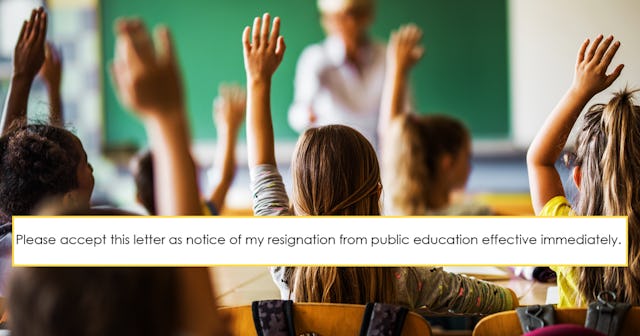Former Teacher's Powerful Resignation Letter Goes Viral

“I won’t be in an abusive relationship with public education any longer”
Former South Carolina elementary school teacher Sariah McCall wrote a resignation letter last fall to let the administration at her district know that she was leaving her profession — and the powerful reasons behind her decision. The letter has since gone viral, and with a teacher rally at the statehouse tomorrow where educators will make their (very reasonable) demands heard, McCall’s words are more poignant — and urgent — than ever.
RELATED: What Is Classroom Management, And How Can You Apply It At Home?
“Please accept this letter as notice of my resignation from public education effective immediately,” she begins.
McCall emphasizes that her choice to leave teaching has nothing to do with her students or fellow educators at Murray-LaSaine, the school where she worked. “I couldn’t have dreamed of a more perfect fit for my class, administrator, and school. I thought I had found my forever school. In fact, the only things keeping me from resigning until now were the love I have for my students, the love I have for the act of teaching, and the heavy guilt I feel for my children being negatively impacted by this in any way: emotionally or academically. However, I cannot set myself on fire to keep someone else warm.”
She cites the “systemic abuse and neglect of educators” in her state as her reasons for leaving. “The unrealistic demands and all-consuming nature of the profession are not sustainable. I am still a human being. There was no time to be a functioning human being and give this job all the attention and love it deserves. This career with its never-ending list of “extra duties and responsibilities” that we are not given the resources for completing.”
McCall explains that she refuses to be “bullied” or guilted into continuing to teach. “It is unrealistic to expect this much from people. We’re teachers, but we’re still people,” she writes.
McCall compares the position she was in to domestic abuse and points to “the list of signs of abuse provided by the Domestic Abuse Hotline.”
“If you replace ‘he’ with ‘public education,’ it would almost match perfectly with what we are all going through across America,” she writes. “If I were to say that my partner is putting me through all of this abuse and mistreatment, people would be putting me in a shelter and insisting that I leave him. But because this is my calling and I must sacrifice myself for the sake of the children, then it’s really not that big of a deal.”
She shares some of the insane expectations of her profession. “Do more with less time, funding, and resources. Take more of the blame, guilt, and responsibility. Be ready to sacrifice your personal life, mental health, and physical safety. Don’t be a complainer. After all, if you only work 7-3 for 180 days of the year, then what could there possibly be to complain about? If only it were that easy.”
She refers to leaving her job as “the hardest act of selfishness I have ever been faced with” but maintains that she needs to put herself “over the demands of helping raise other people’s children.”
“I won’t be in an abusive relationship with public education any longer,” she writes.
McCall, however, understands that until “the perception of public education and other state social services change” her job will not. “Then people will band together for the common goal of elevating these necessary resources to the status of respect they deserve. The public has to demand that they receive the time, funding, and resources they require. We need to prioritize education, not just offer it lip-service. Until enough people decide that this is worth making a fuss over, those that are in power have no reason to listen to our hurt, pleas, and fears to make any changes. This will keep happening. It will not get better like this.”
And that’s exactly what’s motivating thousands of South Carolina teachers (along with parents and supporters) to march tomorrow, May 1, at the Statehouse in Columbia for both better pay and working conditions. After their demands toward lawmakers fell on deaf ears, missing a day of school to march for their own rights seems like the only chance they have at being heard.
McCall tells Yahoo she would like folks to stop just talking about wanting the best for teachers — and actually take action. “I hope that people stop saying that education is important and that teachers deserve better and that our students deserve better and they actually start proving it,” she says.
“Stop saying that education is important and actually make it important. At this point, we’re just crumbling.”
This article was originally published on